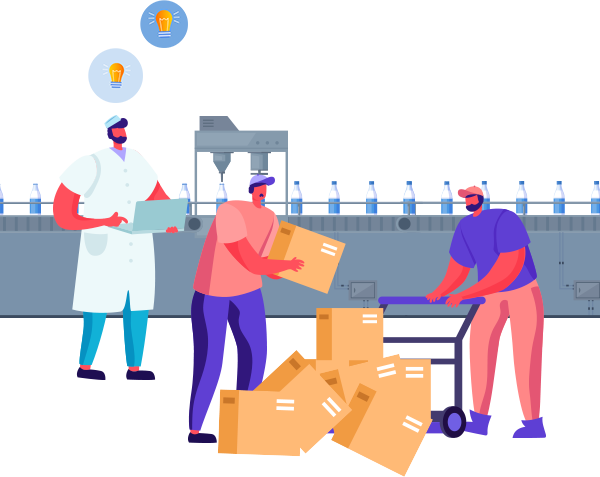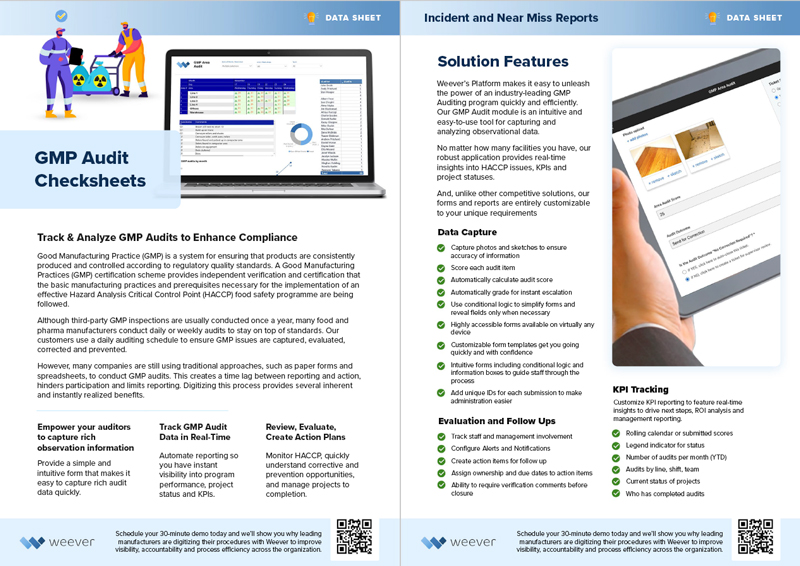GMP Operational Audit Schedule for a Food Company
Andy Pritchard | Dec 7, 2021 | 5 min read

What does a standard Operational Audit Schedule for a typical food company look like?
Organizations involved in the manufacturing and distribution of food are required by law to audit their processes and equipment to ensure basic levels of food safety. The details of these audits are governed by regional legislation.
Food processors and manufacturers are usually required to maintain additional auditing schedules to be compliant with regulatory bodies, which rewards them with membership and access to more sales and distribution opportunities (i.e. Safe Quality Food (SQF) and ISO).
Recently, there has been a growing push by food retailers to demand even more stringent food safety auditing requirements. This process is usually grounded in HACCP (Hazard and Critical Control Points) principles, whereby the organization starts by identifying the major risk areas, creates SOPs (Standard Operating Procedures) to mitigate them and then audits periodically to ensure compliance.
With all of these requirements, it can be hard for food organizations to determine what they need to audit and how often. In a general sense, audit frequency should be based on the risk assessment of each control point - if the risk of contamination is high, then audits should be more frequent (and the inverse is true).
Here is a basic overview of the types of audits you should consider and their relative frequency. Please note that if you require assistance in setting up your auditing schedule, please consult with a food safety compliance expert. This list is intended for basic educational purposes only.
Pre-Production Checks
How often?
- Daily or per batch/shift
Who?
- Executed by operator at the beginning of a production run.
Purpose?
- Used to check the cleanliness of equipment and basic hygiene.
- Should be integrated as much as possible into normal operations - owned by individuals who are operating the process.
- Make the checks as straightforward as possible, clearly measurable, and related directly to a CCP you are tracking.
Hygiene Audits
How often?
-
Weekly or Monthly depending on risk
Who?
-
Should be conducted by trained staff members based on schedule.
Purpose?
-
Practices and procedures to ensure hygiene standards for people and equipment.
Internal PRP / GMP Audits
How often?
-
Monthly depending on risk
Who?
-
Trained professional with knowledge and training on GMP and PRP auditing.
Purpose?
-
Ensuring regulatory compliance points are in compliance. Processes, HACCPs and Employee Practices (SOPs). Are required records being kept for cleaning and sanitation. Capture photos and comments.
HACCP Audits & System Compliance Audits
How often?
-
Every 6 months or annually depending on risk
Who?
-
Should be conducted by trained staff members based on schedule.
Purpose?
-
You are auditing your original assessments and conclusions that informed the creation of your HACCP plan to confirm it is still accurate.
-
You will review all Hazards and Critical Control Points to understand if they are still "critical" and if the controls are still valid.
-
The System Compliance audit is a similar process but conducted for your entire food safety system, including legal requirements, regulations and internal SOPs and controls

bandjlogo

Bell-logo-New

Canadian-Tire-Logo

Diageo-customer-logo

greyston-bakery-logo

hello-fresh-customer

marks-customer-logo

CSL_Limited_logo

monin-logo

Winland Food

Mars-logo-main

rise-baking-customer-logo

Rockwool-Customer-Logo-min

Sportcheck-customer-logo

unilever-customer-logo

walmart-logo-small

husqvarna-customer-logo

Ajinomoto_logo

Peet's_Coffee_logo

Royal-Canin-Logo
